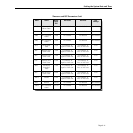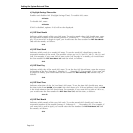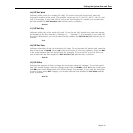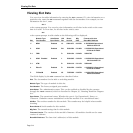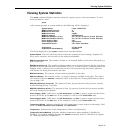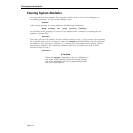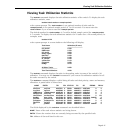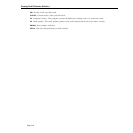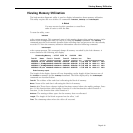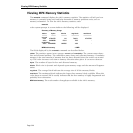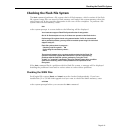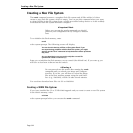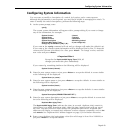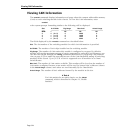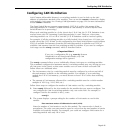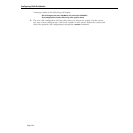
Viewing Memory Utilization
Page 9-19
Viewing Memory Utilization
The leak monitor diagnostic utility is used to display information about memory utilization.
This utility requires the use of three UI commands: leakstart, leakstop and leakdumpall.
♦ Note♦
You may want to log this operation to a text file to
make it easier to view the data.
To start the utility, enter
leakstart
at the system prompt. This command starts a leak monitor daemon that gathers memory infor-
mation in the background until you stop it by using the leakstop command. The leakstop
command stops the leak monitor daemon from recording data and preserves the data already
recorded. To view the memory utilization information enter the following command
leakdumpall
at the system prompt. This command dumps all memory recorded by the leak daemon. A
screen similar to the following will display.
Outstanding Memory - at TUE APRI 24 19:00:29 2001
Task ID Name Functi 1 Functi 2 Functi 3 Address Len Time
======== ======= ======== ======== ======== ======= === ======================
49a69a58 tUi_she 484fe4do 484f1284 484ffbc8 4800ef28 9 TUE APR 24 18:06:4 7 2001
49559bb8 t_AtmMg 49db6e90 49d6a780 49d4c3bd 4800ef88 16 TUE APR 24 18:06:4 6 2001
49559bb8 t_AtmMg 49db6e90 49d4be4c 49d8639c 4800efb8 64 TUE APR 24 18:06:4 6 2001
49559bb8 tUi_she 49db6e90 49d9cce4 49d9c910 4800f050 4 TUE APR 24 18:06:4 6 2001
End of memory report.
The length of the display shown will vary depending on the length of time between use of
the leakmon command and the leakstop command. The fields displayed by the leakdumpall
command are described below.
Task ID. The address of the task that is allocating the block of memory.
Name. Name of the task that is allocating the block of memory.
Functi 1, 2, 3. These three columns indicate functions entered above the malloc package. Func-
tion 1 is the function that called malloc. Function 2 is the function that called Function 1.
Function 3 is the function that called Function 2.
Address. The starting address space for the memory that was allocated.
Length. The length of the block requested on the alloc( ) call
Time. The timestamp taken when the alloc call occurred.



